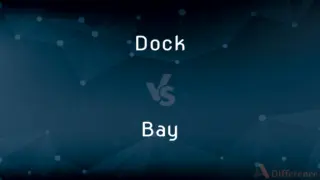Rollback vs. Fallback — What's the Difference?
Edited by Tayyaba Rehman — By Fiza Rafique — Updated on October 25, 2023
Rollback refers to reverting to a previous state or version. Fallback is an alternative plan or method when the primary fails. Both involve contingencies, but rollback undoes, while fallback provides a backup.

Difference Between Rollback and Fallback
Table of Contents
ADVERTISEMENT
Key Differences
Rollback typically signifies a return to a previous state or version after an unsuccessful change or update. Whenever an operation doesn't go as planned, a rollback ensures that systems or processes revert to their earlier state, ensuring stability and continuity. On the other hand, Fallback indicates a plan or method that can be relied upon if the primary approach doesn't work. It’s an alternative that's kept in reserve for unforeseen circumstances.
In the context of software, a rollback might occur if a new software update causes unforeseen issues. The developers might decide to revert the software to its previous version, ensuring users can continue working without disruptions. Fallback, in this setting, might refer to an alternative software or tool that users can utilize if the main software doesn't function as intended.
For database management, a rollback command ensures that if a transaction doesn't complete successfully, all the changes made during that transaction are undone, preserving data integrity. In contrast, a fallback could be an alternative database or backup system that takes over when the main database encounters problems.
Rollback is reactive; it comes into play when something has gone wrong, and there's a need to revert. It aims to return to a known good state. Fallback, however, is proactive. It's a plan devised in advance to ensure continuous operation when a primary method fails. Both are crucial for risk management and maintaining seamless operations, but they serve different purposes.
Comparison Chart
Definition
Reverting to a previous state or version.
An alternative plan or method when the primary fails.
ADVERTISEMENT
Nature
Reactive
Proactive
Context
Undoing actions or operations.
Using a backup or reserve plan or method.
Primary Purpose
To ensure stability by returning to a known good state.
To ensure continuity in the face of failure.
Example
Reverting a software update.
Switching to a backup server when the primary one fails.
Compare with Definitions
Rollback
A return to a previous state or condition.
After the failed update, the team initiated a rollback to the last stable version.
Fallback
An alternative method or option.
If the main server is down, the fallback server takes over.
Rollback
A decrease in prices or rates.
The company announced a rollback in prices to attract more customers.
Fallback
A decline or deterioration after progress or achievement.
After months of improvement, his health took a sudden fallback.
Rollback
Reversion to an earlier policy or measure.
The government faced criticism for its rollback on environmental regulations.
Fallback
Something or someone to turn to in case of need or failure.
In tough times, he always considered his family his fallback.
Rollback
An automated recovery from a failed operation.
The system has a rollback feature to prevent data corruption.
Fallback
A backup plan when the primary fails.
The team had a fallback strategy in case the launch was delayed.
Rollback
In political science, rollback is the strategy of forcing a change in the major policies of a state, usually by replacing its ruling regime. It contrasts with containment, which means preventing the expansion of that state; and with détente, which means a working relationship with that state.
Fallback
A retreat to a defensive position.
The army had a fallback position further up the hill.
Rollback
A reduction, especially in prices or wages, to a previous lower level by governmental action or direction
A price rollback.
A rollback of military supplies.
Fallback
An act of falling back.
A failure of one of the rocket's first-stage engines just after liftoff would result in a destructive pad fallback.
The black hole formed as a result of fallback of ejecta onto the neutron star initially created by the supernova explosion.
Rollback
A turning back or retreat, as from a previously held position or policy
Hoped for a rollback of support for the opposition's proposed legislation.
Fallback
Something to which one can resort or retreat
Applied to another college as a fallback.
Rollback
A return to a prior state by undoing some operation, especially of policy or price changes.
Fallback
A retreat
The colonel ordered a fallback to the woods.
Rollback
A withdrawal of military forces.
Fallback
Something that falls back
The fallback of debris from the explosion.
Rollback
(databases) An operation which returns a database, or group of records in a database, to a previous state (normally to the previous commit point).
Fallback
A backup plan or contingency strategy; an alternative which can be used if something goes wrong with the main plan; a recourse.
As a fallback, I suppose we can use typewriters if the word processing system fails.
Rollback
The situation where a rollercoaster fails to reach the top of a hill and instead rolls backward.
Fallback
(construction) A reduction in bitumen softening point, sometimes called refluxing or overheating, in a relatively closed container.
Rollback
A form of flatbed truck adapted or designed specifically as a tow truck or for transporting other vehicles.
Fallback
Pulverised material that falls back to earth after a nuclear explosion; fallout.
Rollback
(political science) The strategy of forcing a change in the major policies of a state, usually by replacing its ruling regime, or by totally annihilating an enemy's armed forces and occupying the country, as was done in World War II to Italy, Germany, and Japan.
Fallback
That can be resorted to as a fallback.
A fallback plan
Rollback
(aviation) An uncommanded reduction in the thrust of a jet engine.
Fallback
The act or process of falling back.
Rollback
To return to the previous state.
The server is unstable, we need to rollback the changes.
Fallback
Something or someone to which one resorts as an alternative to a failed resource or method.
Rollback
To reduce thrust without having been commanded to do so.
Fallback
To break off a military action with an enemy
Rollback
The act of forcing the enemy to withdraw
Rollback
Reducing prices back to some earlier level
Rollback
The act of undoing or reversing changes.
The database performed a rollback after detecting an error in the transaction.
Common Curiosities
Is Rollback a proactive or reactive measure?
Rollback is reactive, initiated after something goes wrong.
How is Fallback different from Rollback?
While Rollback is about reverting, Fallback is an alternative plan or method when the primary fails.
Can Rollback be used in the context of software?
Yes, a rollback in software means reverting to a previous version after an unsuccessful update.
Is Fallback always a secondary option?
Yes, Fallback is generally an alternative or backup to a primary method or plan.
Can a Rollback be automatic?
Yes, some systems have automated rollback features to recover from failed operations.
What might be a typical use of Fallback in IT?
A fallback can refer to a backup server or system that activates when the primary one fails.
In what situations might one need a Fallback?
Fallback is needed when the primary plan, tool, or method is not feasible or fails.
Why is Rollback important in database management?
Rollback ensures data integrity by undoing transactions that don't complete successfully.
What does Rollback mean?
Rollback refers to reverting to a previous state or version.
Can Rollback refer to policies?
Yes, Rollback can mean a reversion to earlier policies or measures.
Can Fallback refer to people?
Yes, someone can be considered a fallback if they are turned to in times of need or failure.
What’s the essence of having a Fallback plan?
Fallback plans ensure continuity and reduce disruptions when primary methods fail.
Can Rollback refer to prices?
Yes, a rollback can mean a decrease in prices or rates.
How does Fallback ensure operational stability?
Fallback provides alternatives, ensuring that operations can continue even if primary methods fail.
Is Rollback always the best solution when facing an error?
Not always. It's crucial to evaluate the situation; sometimes, a fix might be more appropriate than a rollback.
Share Your Discovery

Previous Comparison
Swabia vs. Bavaria
Next Comparison
Dock vs. BayAuthor Spotlight
Written by
Fiza RafiqueFiza Rafique is a skilled content writer at AskDifference.com, where she meticulously refines and enhances written pieces. Drawing from her vast editorial expertise, Fiza ensures clarity, accuracy, and precision in every article. Passionate about language, she continually seeks to elevate the quality of content for readers worldwide.
Edited by
Tayyaba RehmanTayyaba Rehman is a distinguished writer, currently serving as a primary contributor to askdifference.com. As a researcher in semantics and etymology, Tayyaba's passion for the complexity of languages and their distinctions has found a perfect home on the platform. Tayyaba delves into the intricacies of language, distinguishing between commonly confused words and phrases, thereby providing clarity for readers worldwide.











































